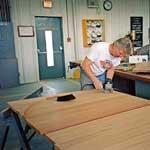- Posts: 2612
- Thank you received: 0
New report: just how much a car commute crushes your soul
- major bean
-

- Mountain Legend
-

Vacuum tubes.Rockdoc Franz wrote: Certainly research og this type must be taking place.
Regards,
Major Bean
Please Log in or Create an account to join the conversation.
- Rockdoc
-

- Mountain Legend
-

rofllol rofllolmajor bean wrote:
Vacuum tubes.Rockdoc Franz wrote: Certainly research og this type must be taking place.
Please Log in or Create an account to join the conversation.
- ScienceChic
-
 Topic Author
Topic Author
- Mountain Champion
-

- Posts: 15746
- Thank you received: 320
But CMM, even the use of your own car on the road requires "public funds for transportation" - building and maintaining roads is done with taxpayer dollars.conifermtman wrote: Just more left wing dribble to get people to buy into public transportation.
Yeah, and look at how fat, lazy, and selfish our society has gotten - is that a route in which we wish to continue? We bemoan obesity, and couch-potato, video-game obsessed children, yet piss and moan when we have to walk too far into the store from the parking lot, or it takes 10 minutes extra on that usual route b/c there was some other a-hole who wasn't paying attention, and in a hurry, who caused an accident and made us late? Since when is it such a hardship to get dropped off 2, or 5, or even 10 blocks from a destination? Or to have an extra 20 minutes to catch up on reading, or fine-tuning that report that is due? We've become a society of self-centered, gotta-have-it-and-have-it-now-and-have-it-my-way, clueless, shallow, it's-all-about-me @$$holes who are used to hopping, by themselves 95% of the time, into their own cars, sitting on their @$$es, everyone else on the road be d@*ned, park as close as possible, and cut it as close as possible so I don't "waste my time" and can hurry up and do the next unimportant thing on my list type of people and I would think that conservatives and liberals alike would prefer those kinds of prevalent attitudes to end. Public transportation does not cater to any of that: you have to budget your time well - plan ahead so as to make it on time to where you are required to be, chat with your fellow neighbors on the same bus route (develop a sense of community, and make friends, in person instead of online), educate yourself with some good books, relax, and reduce driving stress (and improve your health a thousand-fold with that alone). And that should be something that is embraced by those who value responsibility, hard-working dedication, considerateness, and a feeling of belonging to the rest of the community, no matter your political leanings.For most people public transportation does not work out because it does not take the precise route needed to get from point a to point b.
If more people used public transportation, chances are really good that schedules would improve - supply and demand is what the free market is all about, right?Now I do take the lightrail downtown because it drops me right off in front of my building, but for any of my other use cases it does not work out. What can take someone 20 minutes in a car can take over an hour on a bus. Exactly how is that better? On top of that you have to plan your life around the bus or train which most of the time does not work out. Even if you live on a particular bus or light rail route getting onto another route is a long process.
Not sheeples, but people who were all in it together and had common goals is what started and built this country. Aside from a very few individuals, most who went west to conquer the untamed lands did so in groups - as communities - for there is strength in numbers, and when survival is on the line, greater numbers in a community means more help and better odds at making it through the next winter alive. Our government was created to serve us, and despite abuses of power, it still does. Public transportation does not make one dependent on the government, (since even the use of cars is dependent on the government), it merely makes a person change their lifestyle.major bean wrote: Public transport only makes you dependent upon the government (subsidied companies). "We're all in this together" type of sheeples is not what built this country and makes us distinctive from all other cultures that have ever been on the face of the earth.
Individualism for its own sake is detrimental to the species as a whole, and in this day and age, not reality for the majority of the population - who really survives all on their own when you have grocery stores providing your food, houses already pre-built that all you have to do is pay for, etc? And right now, our very independence and freedom is being threatened by those from whom we send billions of dollars every year for their oil - how does that help us?Independence, freedom, rugged individualism. That's what life is all about! Hunt the buffalo and take the risks with which it is associated.
http://www.grist.org/article/2011-01-26 ... -the-union
We need trains to ‘win the future’
by Tom Philpott 26 Jan 2011
All of this got me thinking about the late historian Tony Judt's splendid, posthumously published essay in the Jan. 13 New York Review of Books, called "Bring Back the Rails!" ...the main takeaway of Judt's essay is that trains -- in stark contrast to cars and planes -- are a public good that needs public funding. Trains serve an increasingly important public function, both environmentally and in terms of, yes, convenience, he argues:
The cost of oil -- effectively stagnant from the 1950s through the 1990s (allowing for crisis-driven fluctuations) -- is now steadily rising and unlikely ever to fall back to the level at which unrestricted car travel becomes economically viable again. The logic of the suburb, incontrovertible with oil [he means gasoline] at $1 a gallon, is thus placed in question. Air travel, unavoidable for long-haul journeys, is now inconvenient and expensive over medium distances: and in Western Europe and Japan the train is both a pleasanter and a faster alternative. The environmental advantages of the modern train are now very considerable, both technically and politically. An electrically powered rail system, like its companion light-rail or tram system within cities, can run on any convertible fuel source whether conventional or innovative, from nuclear power to solar power. For the foreseeable future this gives it a unique advantage over every other form of powered transportation.
But because of the high cost of building out and maintaining train networks, they require public support (as, of course, do cars, in the form of road maintanence, etc.). Judt writes:
The railways were and remain the necessary and natural accompaniment to the emergence of civil society. They are a collective project for individual benefit. They cannot exist without common accord (and, in recent times, common expenditure), and by design they offer a practical benefit to individual and collectivity alike. This is something the market cannot accomplish -- except, on its own account of itself, by happy inadvertence.
According to Wired, building out a high-speed line linking San Francisco and L.A. would cost about $42 billion. By 2035, the project could be taking 41 million people out of cars and planes on that well-travelled corridor, and generating nearly $3 billion annually in revenue.
"Now, more than ever, the illusions of division threaten our very existence. We all know the truth: more connects us than separates us. But in times of crisis the wise build bridges, while the foolish build barriers. We must find a way to look after one another as if we were one single tribe.” -King T'Challa, Black Panther
The truth is incontrovertible. Malice may attack it. ignorance may deride it, but in the end, there it is. ~Winston Churchill
Please Log in or Create an account to join the conversation.






